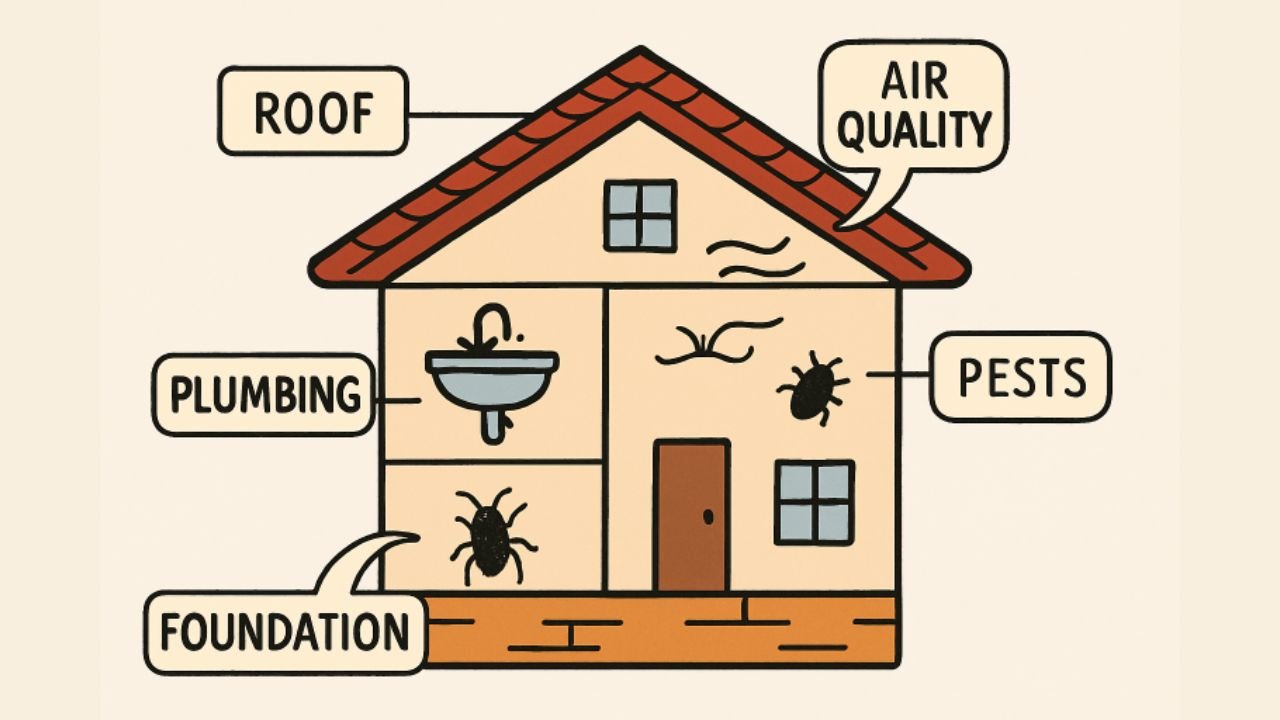Key Takeaways
- Home inspections are crucial for identifying potential hidden problems and safeguarding your investment.
- Both buyers and sellers benefit from understanding inspection options and prioritizing them correctly.
- Specialized inspections may be required based on factors like a home’s condition, age, and location.
Table of Contents
- General Home Inspection
- Pest and Termite Inspection
- Radon Testing
- Mold Inspection
- Sewer Scope Inspection
- Asbestos and Lead Testing
- Energy Efficiency Assessment
- Conclusion
Whether you’re preparing to buy or sell a house, being knowledgeable about the range of home inspection services available can make a significant difference in your real estate experience. Home inspections serve as a crucial checkpoint by unveiling hidden issues before they become costly problems, giving both buyers and sellers clarity and leverage throughout the transaction.
From evaluating foundational safety to examining potential invisible health risks, understanding the scope of different inspection types ensures that every party involved walks away without unpleasant surprises. The more both sides understand what home inspections reveal, the smoother, fairer, and more transparent the entire process becomes for everyone involved.
For buyers, a thorough inspection can reinforce a decision or provide negotiating power if repairs are needed. For sellers, addressing potential problems upfront can smooth out the closing process and reduce the risk of last-minute deal breakers. Recognizing which specialized inspections are relevant also depends on a property’s age, location, and specific characteristics.
Access to the proper inspections and clear, timely reports is a must-have for today’s real estate market. Equipping yourself with reliable inspection reports means you’re better positioned for confident negotiations and successful transactions.
General Home Inspection
One of the first steps in any thorough due diligence process is a general home inspection. This evaluation encompasses the visible and accessible systems and components of a house, including the roof, foundation, electrical, plumbing, heating, and cooling systems. General inspections highlight significant safety hazards, existing defects, or future maintenance concerns, but may not uncover hidden or inaccessible issues. According to Consumer Reports, a good inspector is trained to spot both warning signs and recommend further specialized evaluations if needed.
Pest and Termite Inspection
Pest and termite inspections look for evidence of activity or damage caused by wood-destroying organisms, including termites, carpenter ants, and beetles. These pests can remain unnoticed for years, silently undermining the property’s structural integrity. Infestations are especially prevalent in specific regions and can have a significant impact on a home’s value and desirability. Early detection and remediation are essential to prevent extensive damage, as highlighted by Bankrate.
Radon Testing
Invisible and odorless, radon is a radioactive gas formed naturally in the ground. It can seep into homes through cracks in the foundation. Long-term exposure to elevated radon levels is associated with an increased risk of lung cancer, making radon testing particularly important in some geographical regions. The test can take a few days and is best performed by certified professionals who follow EPA protocols. For more about potential health concerns and how testing works, refer to the Centers for Disease Control and Prevention (CDC).
Mold Inspection
Mold can cause respiratory issues, allergies, and other health concerns, particularly in homes with a history of water damage or high humidity levels. A mold inspection identifies visible growth, evidence of moisture, and the likely points of water intrusion. Molds can hide inside walls, under carpeting, and even above ceilings. Addressing mold problems early not only protects health but also avoids costly remediation down the line.
Sewer Scope Inspection
Older homes or properties surrounded by large, mature trees often face a greater risk of sewer line blockages, cracks, or root invasion. A sewer scope inspection uses a specialized camera to survey the condition of the sewer line between the house and the municipal system or septic tank. Early detection of issues means you won’t face unwelcome, expensive repairs after moving in, making it an invaluable component of your overall inspection strategy.
Asbestos and Lead Testing
Many homes built before 1980 were constructed with materials containing asbestos or painted with lead-based paints. Both substances are now recognized as hazardous, particularly during renovations or repairs when particles can be released into the air. Specialized testing determines if these materials are present and if remediation is necessary for health and safety. The U.S. Environmental Protection Agency (EPA) provides crucial guidance on the risks and responsibilities associated with these threats.
Energy Efficiency Assessment
Energy efficiency assessments have gained popularity as buyers seek to reduce utility costs and lower their carbon footprints. These evaluations assess insulation, windows, HVAC performance, and air sealing to identify areas where upgrades can lead to energy savings and enhanced comfort. Many local governments and utilities also offer incentives for homeowners who implement recommended improvements, making this inspection both practical and cost-effective.
Conclusion
Awareness of the diverse range of home inspection services is invaluable for anyone entering the real estate market. From foundational safety checks to specialized environmental health tests, these inspections create a roadmap to safer, smarter transactions. By prioritizing preemptive inspections, you can identify and address potential issues, protect your investment, and ensure peace of mind for all parties involved.
You May Also Like: Signs Your Tree Needs Immediate Removal











